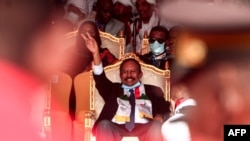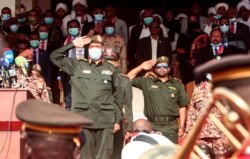Sudanese Prime Abdalla Hamdok is expected to increase the size of the country’s Sovereign Council and cabinet to include members of the Sudan Revolutionary Front, a coalition of rebel groups that signed a peace agreement with the government.
Sudan's cabinet would expand from 20 to 26 ministers. The new ministers have yet to be named but the move is expected to happen within days, according to the Forces for Freedom and Change, a civilian coalition of Sudanese groups.
The Sovereign Council agreed to increase its membership from 11 to 14, to include former rebels who signed a comprehensive agreement with the transitional government in Juba.
In an extraordinary meeting in Khartoum on Wednesday, members of the ruling coalition said Hamdok should continue to be prime minister during the next 39 months of the transitional period. Hamdok is tasked with moving Sudan forward to achieve comprehensive peace, economic reform and a sustainable democratic transformation.
Forces for Freedom and Change officials praised Hamdok for his achievements over the last year, including the signing of the Juba peace agreement between the government and rebel groups and expanding Sudan’s external relations with the international community.
Hassan Haj Ali, a political science lecturer at Khartoum University, told VOA’s South Sudan in Focus that Hamdok will continue to be the only candidate for prime minister for now since the coalition has been coping with internal squabbles of late.
“It is better for them to keep Hamdok, although there are so many criticisms against him, than to get into another dispute over who will succeed him, so this is a kind of freezing the dispute over the replacement of Hamdok [rather] than a vote of confidence in his abilities or his performance,” said Ali.
Ali said even though Hamdok’s performance has not met the expectations of Sudanese revolutionaries this past year, he has scored a few significant achievements.
Apart from Hamdok’s role in expanding Sudan’s relations with the international community, Ali said Hamdok succeeded in reducing international economic sanctions on Sudan and has made progress toward getting the country removed from the U.S. list of countries that sponsor terrorism.
“This is an important contribution to the Juba peace agreement although it is not comprehensive but at least it is a big step forward toward achieving a complete peace in the county. And the way he managed the relationship with the military component, also is another credit,” Ali told VOA.
He noted Hamdok has also been a key player in reforming Sudan’s laws that move the country closer to becoming a democracy. Several European leaders have praised Hamdok’s leadership, but Ali warns that some of Sudan’s regional allies are working to promote the country’s military component over its civilian makeup.
“Promoting civilian [rule] means consolidating democracy in the country and democracy brings a lot of concerns for these Gulf countries. From my own observations, also the Egyptians prefer the military. Sissi (Egyptian President Abdel Fattah el-Sissi) himself is a military guy and he can communicate better with the military counterpart here in the country,” said Ali.
Ali believes the main challenge facing Sudan is its deteriorating economy.
“We need new programs, new directions for the government to tackle how to increase the production in the country, and how to enhance the capabilities of the Sudanese people in order to increase the export of the country. But the expansion is mainly a political move in order to accommodate the government,” Ali told VOA.
The transitional period was renewed for 39 months beginning October 3, in accordance with the peace deal signed in Juba, South Sudan.







